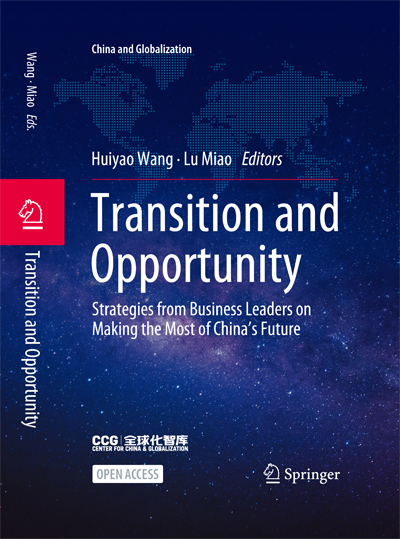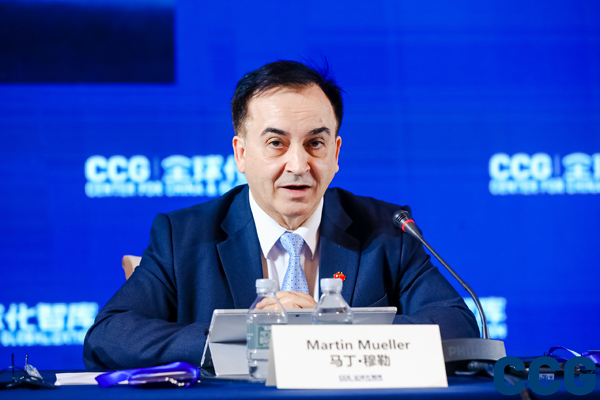Chairman of the Swiss-Chinese Chamber of Commerce: The Significance of International Business
“A free flow of business relationships and person-to-person interaction has been the life blood of commerce for much of the last few decades, but this has been suddenly interrupted due to the Covid-19 pandemic. It is especially important in this context to take a step back and “look over the fence” to assess where relations currently stand. In this assessment, the importance of the cultural environment cannot be overlooked.”
——Martin Mueller, Chairman of the Swiss-Chinese Chamber of Commerce.
1. The Fundamental Importance of International Business Relations
Every entrepreneur knows the importance of occasionally taking a bird’s eye view of one’s own business activities. In Switzerland we call this taking “a look over the fence”. We are now well into 2021. More than a year has passed since COVID- 19 interrupted the free flow of people-to-people business relationships and this has happened in an entirely unexpected, unprepared, and unprecedented way. This tiny virus has initiated a tug of war: fear versus faith, apathy versus hope, greed versus fairness, selfishness versus generosity, and ignorance versus awareness. This may sound dramatic, but it accurately reflects the times we are currently living in—a time that feels extreme and critical on many levels. Let’s step back for a moment, widen our view, and examine why the free flow of international business between individuals, enterprises, and organizations is and always will be of vital importance to the human race.
The prevalence of international business has increased significantly during the last part of the twentieth century, thanks to the liberalization of trade and investment and the development of technology. Of course, there are many other international exchanges in place such as diplomatic, cultural, scientific, tourism, and international sporting events. These are essential and necessary, but they are mostly just short-term or related to small groups. Only international business can create wide-range, long-term, grassroots, people-to-people exchanges through strong networks with pragmatic development that is nonviolent, mindful, and respectful of each other’s differences and strengths.
In countries where media is very much focused on purely domestic information, some people have exaggerated ideas about themselves. They think of themselves as bigger than they really are, and only their own worldview is the right one. Only through in-person international business travel and exchange are such individuals and enterprises granted an eye-opening reality check and only then do they discover their real position and the value of their capabilities. In recent history, some governments and groups of people have begun to promote division and isolation, developing concepts that conceal their unilateralism. Such selfish actions are hostile toward the world. Greed and protectionism are hurting hundreds of thousands of small businesses and millions of individuals. As a result of this trend, we will most likely experience even more profound polarization in the next few years as the firestorm of misinformation continues to burn.
Fortunately, businesspeople of all races and beliefs, who have personally experienced other countries and have developed personal relationships, will be able to distinguish between lies and truth.
Despite the struggle conveyed above, I believe the coming years will initiate a continuous progressive curve toward a more humane world. Jointly addressing climate change, equality, and expanding political alliances is entirely possible, but this will most likely take place against a background of natural disasters, violence, and extremism. Building trust, understanding, solving problems, and achieving success together is the only way to—finally—build a better future for all mankind.
If the leading people of all nations would critically and honestly analyze themselves, everybody would have to admit that, on the whole, we have done a terrible job. How is it possible, after thousands of years of evolution and development, that we are still acting so immature and primitive, to put it nicely? There is still a huge amount of gender suppression toward women or toward groups of people who adhere to a different belief system, or have a different skin color, or carry a different country’s flag. We are still polluting our beautiful planet as if there were no tomorrow! Think about it. What could we, the inhabitants of this planet, achieve if we were to learn how to work together and create just a simple five-year plan together? What is keeping us from becoming smarter, more sustainable, and acting more responsibly?
We need an integrative, inclusive world economy that does not continue to produce more losers and victims. This is not just the idealistic wish of some dreamers; many international organizations have put this at the top of their agenda. Repeating this sentence over and over does not help, we must take action! Every entrepreneur and institution is responsible and must be asked to take a sustainable, holistic approach instead of carefree, narrow-minded, short-term thinking.
We do not need to wait for a government or a world organization to take the initiative. Many of us can start now by acting in a responsible way in domestic and, even more so, in international business projects. The good thing is that even one bold decision by a single country may create a ripple effect that spreads throughout the world. For example, new environmental regulations implemented in one country may force foreign enterprises to comply or watch their business in that market or become irrelevant. With a little bit of common-sense guidance from local lawmakers, international businesses can become the vehicles driving organic growth toward a sustainable, accountable, and comprehensive world economy.
2. Understanding of Cultural Environment is Key to Success
Now let us take a closer look at some international business projects. International business occurs in many different formats: from the movement of goods from one country to another to the licensing of products or processes, and franchising, as well as the formation and operations of sales, manufacturing, research and development, and distribution in foreign markets.
Participation in international business allows countries and their enterprises to leverage their local comparative advantage, their unique specialized expertise, and an abundance of different factors related to the production of and delivery of goods and services into the international marketplace. International business also promotes competition in domestic markets and introduces new opportunities to foreign markets. Global competition helps companies become more innovative and efficient in their use of resources. Today, global competition affects nearly every company—regardless of size. For consumers, international business introduces them to a variety of goods and services. For many, it enhances their standard of living and increases their exposure to new ideas, devices, products, services, and technologies. To ensure success in a foreign market, international businesses must understand the many factors that affect the competitive environment and effectively assess their impact.
2.1 Economic Environment
Economic environments may be vastly different from one country to the next. The economies of various countries may range from developed and emerging, to less developed. This brings a vast array of variations, which have a major effect on everything from education and infrastructure to technology and healthcare.
2.2 Political Environment
The political environment of international business refers to the relationship between government and business, as well as the political risk of a nation. Therefore, companies involved in international business must be ready to deal with different types of governments and institutions. Because international companies rely on the goodwill of governments, international businesses must consider the political structure of the country in which they intend to operate.
2.3 Competitive Environment
The competitive environment is constantly changing based on economic, political, and cultural contexts. Competition may come from a variety of sources, and the nature of competition may change from place to place. The level of technological innovation is also an important aspect of the competitive environment as firms compete for access to the newest technology. There is no common roadmap.
2.4 Cultural Environment
The cultural environment of a foreign nation remains a critical component of the international business environment, yet it is one of the most difficult to understand. The cultural environment of a foreign country is rooted in commonly shared beliefs and values, formed by elements such as language, religion, geographic location, government, history, and education. It is common for many international firms to conduct a cultural analysis of a foreign country in order to better understand these factors and how they affect international business efforts.
Over the past 40 years of opening-up and development in China, many foreign enterprises have entered the market. Some of them have succeeded and are still flourishing, while others did not and were forced to leave. Based on my observations, a key reason that companies leave is a lack of deep cultural understanding, whether of their clients, employees, their local suppliers, the legal framework, etc. From far away, it all looks very simple, but in fact, a lack of cultural understanding will affect your business sooner or later. Of course, this is not only true for China, it is true for any international operation, even for business exchanges between neighboring countries.
One example from Europe, which I experienced when I managed international sales, is about communication, specifically verbal expression. The second most spoken language in Europe is German, which is spoken in Germany, Austria, Switzerland, and Lichtenstein. So, if someone wants to open a production facility, an R&D, or logistics center there, everything may go well. But if you want to do personal sales, no single person would be able to cover the entire geographical region. The cultures of these countries are considerably different when it comes to sales and sales talk, which makes local people essential if you want to be successful.
We are living in turbulent times and doing business internationally is often a complex process, but that is fine. We all know after some rough weather, smooth sailing will ultimately return. The world needs millions of cross-border business transactions, and we can do our part by ensuring that the projects we personally conduct are sustainable, efficient, legal, honest, and beneficial for all involved.
My organization, the Swiss Chinese Chamber of Commerce in Mainland China, is ready and well equipped to support Chinese and Swiss entrepreneurs. Acting “smart and sustainable” is our goal and the principle that we promote together with institutions from the Swiss government. Every single person counts when it comes to leaving our children a better economy and a healthier planet.
Martin Mueller is Chairman of the Swiss-Chinese Chamber of Commerce, Founder and Director of SKC Group. Martin’s hometown is St.Gallen in eastern Switzerland where he obtained several degrees in mechanical engineering, an MBA, and a Swiss degree in marketing and sales. During a term at the University of St. Gallen (HSG), he developed new management systems for virtual companies. Later Martin headed the international sales division of the leading Swiss telecommunications company for 16 years and expanded its business into 46 countries. During that time, his personal key customers included Fortune 100 companies such as Airbus, Lockheed Martin, Samsung, etc. As an expert in intercultural business development, Martin acquired expertise in many industries, such as mobile communications, defense, aviation, motorsport, renewable energy, and more. In 2008, he founded the SKC Group in Beijing, which specializes in sustainable construction and concepts for high-end architecture.
// Editor’s note
Transition and Opportunity: Strategies from Business Leaders on Making the Most of China’s Future is the third book in the “China and Globalization” series, published in partnership with Springer Nature. The 22 essays contained in this volume are the work of a wide range of global experts in China’s business community. Contributors include the leaders of international chambers of commerce, CEOs and senior executives from leading MNCs and industry experts or country heads from global consulting firms. In a world of constant change and uncertainty where there is so much in doubt, these perspectives on the future of business in China, which are rooted in real-world experience and proven strategies that work, provide an immense trove of knowledge for those looking make the most of China’s bright future.

Transition and Opportunity
Editors: Huiyao Wang, Lu Miao
Published in February, 2022
Publisher: Springer Nature Publishing Group
Download Book at Springer
https://link.springer.com/book/10.1007/978-981-16-8603-0
Transition and Opportunity: Strategies from Business Leaders on Making the Most of China’s Future is the third volume in CCG’s “China and Globalization” series of books edited by Dr. Huiyao Wang and Dr. Lu Miao.

Series Editors: Huiyao Wang Lu Miao
Publisher: Springer Nature Publishing Group






